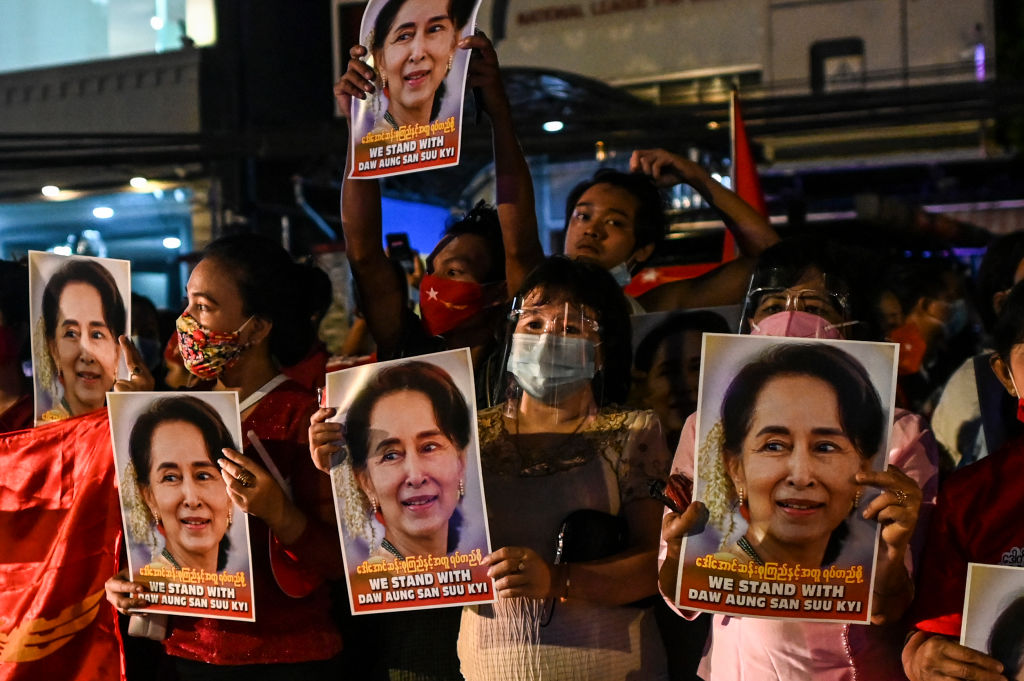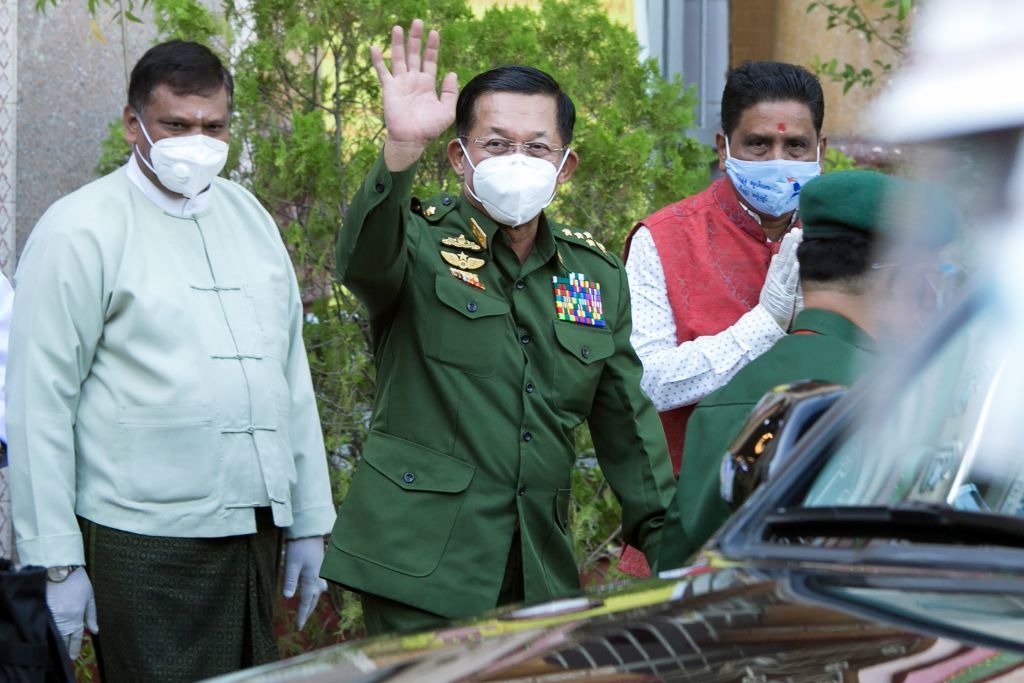Myanmar’s military assumed control of the country in a coup on Monday, ousting the democratically elected government led by Aung San Suu Kyi, and arresting the Nobel laureate and several leaders of her party in early-morning raids. The move came after Myanmar’s generals complained of fraud in the Nov. 8 election—citing evidence that is, at best, disputed.
While military leaders said they were assuming control for one year under emergency powers granted to them in the constitution, the coup seems likely to undo hard-won democratic reforms that the U.S. under the Obama Administration worked to nurture. It comes just five years after Suu Kyi won political leadership of the country in the freest elections in 25 years, after decades of military rule.
“The coup abruptly ends Myanmar’s faulty and fragile push towards democracy over the last decade,” says Lee Morgenbesser, an expert on authoritarian politics in Southeast Asia at the school of government and international relations at Australia’s Griffith University.
The coup will be an early test of President Joe Biden and Secretary of State Antony Blinken’s ability to tackle a foreign policy crisis, while the U.S. struggles with the COVID-19 pandemic, a brutal economic downturn and an impeachment trial.
According to a statement posted on its Facebook page, Suu Kyi’s National League for Democracy called on people in Myanmar to resist the military coup. According to Agence-France Presse, Suu Kyi issued the statement pre-emptively before she was detained.
The message, in Burmese, called the actions of the military unjustified, and said they went against both the constitution and the will of the voters, according to the Associated Press. It warned of a return to “military dictatorship.”
Communications, including phones, TV broadcasts and internet in many parts of the country, including the capital, were cut or hindered, according to reports. Internet monitoring group Netblocks, said online connectivity had dipped to 50% normal levels Monday morning, before being partially restored by the afternoon.
Suu Kyi won a Nobel Peace Prize in 1991 for her non-violent resistance against the military dictatorship that kept her under house arrest for 15 years. The former human rights icon was lauded by the international community and former President Barack Obama—who eased sanctions on the country and called for engagement with the country—called her a “beacon of hope” for “people reaching for justice.”
But more recently, she has faced international scorn for her response to a violent crackdown by security forces against the Rohingya, a mostly Muslim ethnic minority. U.N. investigators determined that the violent campaign of arson, rape and murder was carried out with genocidal intent. But Suu Kyi has publicly rejected accusations that the military waged a genocidal campaign against the Rohingya.
Why did the military overthrow the Myanmar government?
Fears of a military coup have been simmering in the Southeast Asian nation since the military disputed the results of the November election. Suu Kyi’s NLD won in a landslide victory, capturing 396 out of 476 seats, allowing the party to form a government for five more years. The military-backed Union Solidarity and Development Party won just 33 seats.
The military alleged that it found 8.6 million irregularities in voter lists that could have allowed voters to cast multiple ballots or other forms of “voting malpractice,” according to the Associated Press. But on Jan. 29, the country’s election commission rejected allegations by the military that the election was fraudulent, saying there is no evidence to support the claims.

Min Aung Hlaing, the chief of Myanmar’s military, called the Tatmadaw, said last week it may be necessary to revoke the country’s constitution if the laws it layed out were not being followed.
“The constitution is the mother law for all laws. So we all need to abide by the constitution. If one does not follow the law, such law must be revoked. If it is the constitution, it is necessary to revoke the constitution,” he said.
The same day as the election commission ruling, several Western diplomatic missions, including the U.S, issued a statement urging “the military, and all other parties in the country, to adhere to democratic norms.”
“We oppose any attempt to alter the outcome of the elections or impede Myanmar’s democratic transition,” the statement said.
Read More: Aung San Suu Kyi Defends Myanmar Against Rohingya Genocide Allegations at The Hague
How is the U.S. reacting?
Obama was the first U.S. president to visit Myanmar in 2012; the trip was seen as a strong statement of support by the U.S. on the country’s democratic reforms. Now the reversal in the country’s democratization is likely to be President Joe Biden’s first major foreign policy test.
White House spokesperson Jen Psaki said in a statement that Biden had been briefed on the situation. “The United States opposes any attempt to alter the outcome of recent elections or impede Myanmar’s democratic transition, and will take action against those responsible if these steps are not reversed,” she said.
Secretary of State Blinken said in a statement that the U.S. expresses “grave concern” over the events. “The United States stands with the people of Burma in their aspirations for democracy, freedom, peace, and development,” he said. “The military must reverse these actions immediately.”
“I hope the Biden administration and our many allies in Asia are able to remind Myanmar’s military leaders how bad things were for their country before they embarked on political reforms a decade ago,” says Dan Slater, the director of the Weiser Center for Emerging Democracies at the University of Michigan. “Lectures on democratic values won’t do any good, but making the case along with our allies that they’re embarking on a path that only ends in terrible places for Myanmar might give them some pause before they cross the Rubicon of a full-blown military takeover.”
Australia’s foreign minister Marise Payne also issued a statement on Monday. “We call on the military to respect the rule of law, to resolve disputes through lawful mechanisms and to release immediately all civilian leaders and others who have been detained unlawfully,” it said.
“The military’s actions show utter disdain for the democratic elections held in November and the right of Myanmar’s people to choose their own government,” said Brad Adams, Asia director at the NGO Human Rights Watch. “We are especially concerned for the safety and security of activists and other critics of the military who may have been taken into custody.”
In a statement issued by his spokesperson, United Nations Secretary-General António Guterres voiced “grave concern” over the transfer of powers to the military, which he said “represent a serious blow to democratic reforms in Myanmar.”
Who is Min Aung Hlaing?
Power has been handed to Senior General Min Aung Hlaing, according to the broadcast on the military-owned television station.
He was named commander-in-chief in 2011, taking over amid a transfer to a quasi-civilian government following nearly 50 years of direct military rule.
Despite the ostensible democratic reforms in the country in recent years, the military commander-in-chief retained powerful influence, including command of the defense, border affairs and home affairs ministries, whose reach is pervasive.
Experts say the coup may have been engineered by the powerful figure for personal reasons.
“This could be being driven by the personal ambitions of Min Aung Hlaing, who was due to retire in six months,” Mark Farmaner, the director of the London-based advocacy group Burma Campaign UK, tells TIME. “He has also used his position to ensure his family have lucrative businesses interests, which he won’t be in a position to protect after retirement.”

In July 2019, the 64-year-old and three other military leaders were barred from traveling to the U.S. for their roles in the ethnic cleansing of the country’s Rohingya Muslim minority. Further sanctions were placed on the military leaders in December of the same year to freeze any U.S. assets and prohibit any Americans from doing business with them.
Read More: Meet Min Aung Hlaing, the Chief of Myanmar’s Notorious Military
What does the coup mean for Myanmar’s democratic reforms?
It’s not the first coup in the country’s history; a 1962 coup brought the military to power. After a series of protests known as the 8888 Uprising, another coup in 1988 brought to power the military junta that would rule for the next 22 years.
Myanmar began a series of democratic reforms in 2011 toward what the army called “discipline-flourishing democracy.” An election in 2015 which brought Suu Kyi to power, was deemed its freest general election in 25 years.
Still—the country’s 2008 constitution guaranteed the military 25% of seats in parliament and veto power over constitutional changes.
Farmaner, the director of Burma Campaign UK, says that the coup represents a significant change in strategy for the military, but that it will put them under increased pressure. “It is very hard to see how the military can benefit from this coup,” he says. “They will face protests and renewed international sanctions.”
Morgenbesser, of Griffith University, says that the motivation for the military is to “remake the political status quo” in the wake of the second election that saw military-backed parties routed. “Given efforts by Aung San Suu Kyi’s ruling government to curb the political power of the military, especially its fixed allotment of seats in parliament, the Tatmadaw acted preemptively today.”
Morgenbesser adds that an international response to the events on Monday may be dampened by the need to balance defending democracy in Myanmar, without lending credibility to Suu Kyi, who he says has herself “undermined its implementation since 2015.”
It remains to be seen what will come next for Myanmar.
“The big immediate questions are whether the arrested civilian leadership is safe, and whether major protests by NLD and democracy supporters will erupt,” says Slater, of the University of Michigan.
“The next questions are whether the military is doing this so they can find a way to share power with more agreeable civilian politicians, or whether they’re giving up on power-sharing entirely.”
More Must-Reads From TIME
- The 100 Most Influential People of 2024
- The Revolution of Yulia Navalnaya
- 6 Compliments That Land Every Time
- What's the Deal With the Bitcoin Halving?
- If You're Dating Right Now , You're Brave: Column
- The AI That Could Heal a Divided Internet
- Fallout Is a Brilliant Model for the Future of Video Game Adaptations
- Want Weekly Recs on What to Watch, Read, and More? Sign Up for Worth Your Time
Write to Amy Gunia at amy.gunia@time.com